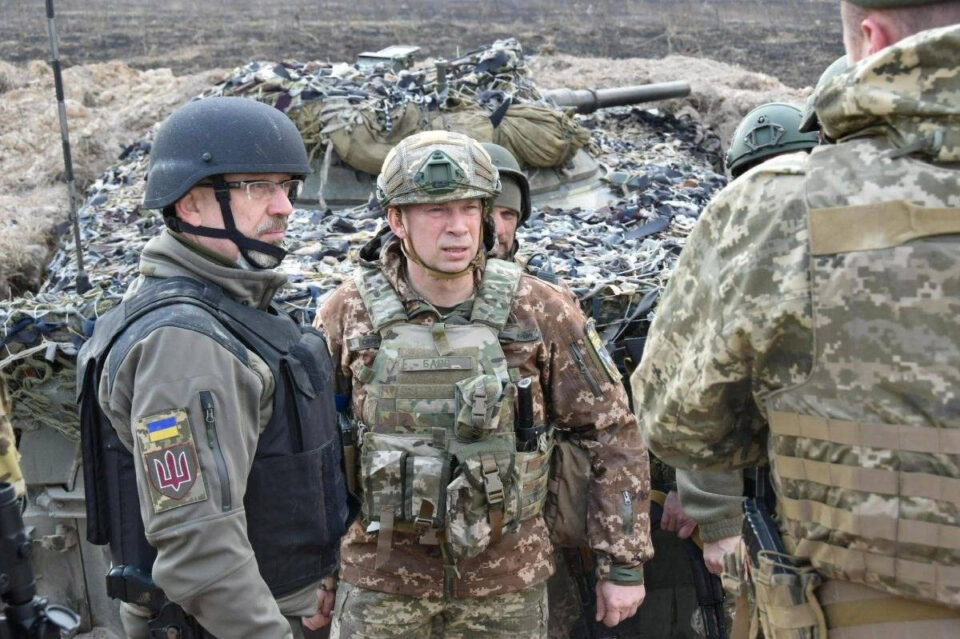BUCHA/LVIV, Ukraine, (Reuters) – Ukrainian troops are recapturing towns east of Kyiv and Russian forces who had been trying to seize the capital are falling back on overextended supply lines, Britain said today, one of the strongest indications yet of a shift in momentum in the war.
The mayor of a suburb east of Kyiv said Ukrainian troops had recaptured a nearby village and thousands of civilians were leaving the area in response to a call from the authorities to get out of the way of the counter-attack.
A month into their assault, Russian troops have failed to capture any major Ukrainian city. An offensive Western countries believe was aimed at swiftly toppling President Volodymyr Zelenskiy’s government was halted at the gates of Kyiv.
The Russians instead have been bombarding, encircling and besieging cities, laying waste to residential areas and driving around a quarter of the 44 million population from their homes.
U.S. President Joe Biden was due to visit Poland for a first-hand look at the refugee crisis, which has seen 3.6 million Ukrainians flee abroad.
Battlelines near Kyiv have been frozen for weeks with two main Russian armoured columns menacing the capital from the northwest and the east. But in an intelligence update on Friday, Britain described a Ukrainian counter-offensive that had pushed Russians far back in the east.
“Ukrainian counter-attacks, and Russian forces falling back on overextended supply lines, has allowed Ukraine to reoccupy towns and defensive positions up to 35 km east of Kyiv,” the update said.
Volodymyr Borysenko, mayor of Boryspol, an eastern suburb where Kyiv’s main airport is located, said 20,000 civilians had left the area, answering a call to clear out so Ukrainian troops could push the Russians further back.
Ukrainian forces had recaptured a village from Russian troops the previous day between Boryspol and Brovary, and would have pushed on further but had halted to avoid putting civilians in danger, he said.
On the other main front outside Kyiv, to the capital’s northwest, Ukrainian forces have been trying to encircle Russian troops in the adjacent suburbs of Irpin, Bucha and Hostomel, reduced to ruins by heavy fighting over the past few weeks.
In Bucha, 25 km (15 miles) northwest of Kyiv, a small group of Ukrainian troops armed with anti-tank missiles was digging foxholes. Andriy told Reuters had enlisted to defend the town as soon as the invasion began.
“I told my wife to grab the children and to hide in the basement, and I went to the drafting station and joined my unit straight away,” he said. “My wife and children were under occupation for two weeks, but then they managed to escape through a humanitarian corridor.”
Moscow calls its actions in Ukraine a “special military operation” to disarm its neighbour. Kyiv and its Western allies call it an unprovoked war of aggression and say Russia’s true aim was to overthrow the government of what President Vladimir Putin regards as an illegitimate state.
Unable to capture cities, Russia has resorted to pounding them with artillery and air strikes. Worst hit has been the eastern port of Mariupol, a city of 400,000 under siege since the war’s early days. Tens of thousands of people are still believed to be trapped inside with no access to food, power or heat, while the city around them has been reduced to ruins.
In a part of the city now captured by the Russians, one woman waiting in line to receive food supplies told Reuters her diabetic husband had slipped into a coma and died. He was buried in a flowerbed.
“We are planning on leaving but it’s very difficult at the moment,” the woman, who gave her name as Alexandra, said. “I can’t leave my husband in a flowerbed … And then we have nowhere to go.”
For the first time on Friday, Mariupol’s city council gave an estimated death toll for the bombing of the city’s main theatre on March 16, saying witnesses now said 300 people had been killed among many hundreds sheltering in the basement.
In the days after the bombing, Ukrainian officials had said 130 people had been rescued from a bomb shelter that withstood the blast, but it was impossible to know how many were buried. Russia denies blame for destroying the Drama Theatre, which was blown up despite the word “children” being marked out on the ground outside.
The United Nations said it was looking into reports of mass graves inside Mariupol, including one where at least 200 people were buried. No independent journalists have operated inside the Ukrainian-held centre of the city for the past 10 days.
The cities of Chernihiv, Kharkiv and Sumy in the east have also sustained devastating bombardments. Chernihiv was effectively surrounded by Russian forces, its governor said.
In Kharkiv, police said four people had been killed by the shelling of a centre for distributing humanitarian aid. Russia denies targeting civilians.
ANTI-SHIP MISSILES
After attending an emergency summit of NATO and the G7 in Brussels on Thursday, Biden is visiting Poland, which has taken in more than half of Ukraine’s refugees.
The West has ruled out intervening on the ground or answering Ukraine’s plea for a no-fly zone, but has supported Kyiv with hundreds of anti-tank and anti-aircraft weapons that have blasted Russian armoured columns and prevented Moscow from taking control of the air.
A senior U.S. administration official said Washington and its allies were also working on providing anti-ship weapons to protect Ukraine’s coast. Ukrainian forces claimed on Thursday to have blown up a Russian landing ship in a Russian-occupied port.
U.S. officials told Reuters that Russia is suffering failure rates as high as 60% for some of its precision-guided missiles.
With stocks of precision-guided munitions running low, Russian forces were more likely to rely on unguided bombs and artillery, Under Secretary of Defense for Policy Colin Kahl said.

